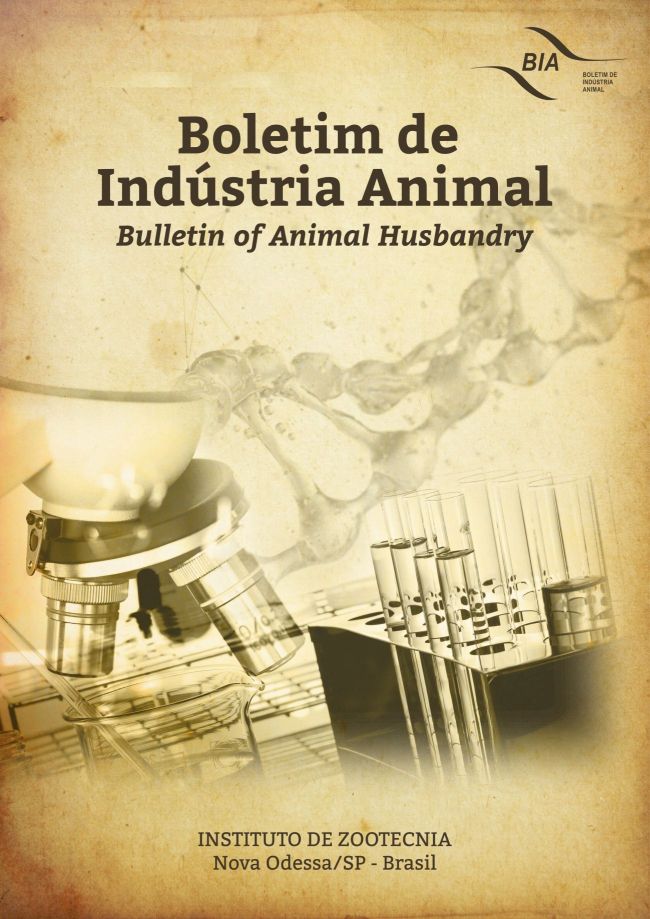Quality of hamburger and sausages made with meat of lambs fed with sunflower seeds and vitamin E
DOI:
https://doi.org/10.17523/bia.2019.v76.e1442Keywords:
antioxidant, oilseeds, processed products, sheepAbstract
The objective of this study was to evaluate qualitative aspects of hamburgers and sausages made with meat from less noble cuts of carcasses from lamb fed with sunflower seeds and vitamin E. The processed was prepared using meat from the neck and ribs of 32 Ile de France lambs slaughtered when body weight reached 32 kg. Lambs were divided into four treatment groups of eight animals, receiving different feedings: SC €“ sugarcane + concentrate; SCS €“ sugarcane + concentrate with sunflower seeds; SCE €“ sugarcane + concentrate containing 1000 mg vitamin E/ kg of diet dry matter (DM) and SCSE €“ sugarcane + concentrate with sunflower seeds and 1000 mg vitamin E kg/ of diet DM. It was observed interaction between sunflower seeds and vitamin E (P<0.05) for pH, color, tenderness and lipid oxidation of burgers and lightness, yellowness, water holding capacity and tenderness of sausages. Additionally, in the sausages, it was found a difference (P<0.05) between treatments for the variables, cooking loss, redness (a*) and lipid oxidation with the inclusion of sunflower seeds, being these two last also influenced by the inclusion of vitamin E in the diet (P<0,05). Burgers made with lamb€™s meat fed with control diet (SC) had bigger pH (5.77), and burgers and sausages of the SCSE treatment had the highest a* value 9.40 and 8.79 and lower lipid oxidation, 4.42 and 2.15 mg malonaldehyde/ kg of sample, respectively. Tenderness was bigger (0.57 kgf/ cm2) in the sausages from animals fed with SCS and smaller (0.31 kgf/ cm2) in the sausages made with lamb€™s meat of the treatment SCSE. The SCSE€™s sausages presented higher PPC (23.03%) than sausages of the animals that were fed only with sun flower seeds (17.21%). Meat from lambs fed with sunflower seeds and vitamin E can be used to make processed products. Hamburger and sausages are good alternatives for sheep meat processing.
Downloads
Downloads
Published
Issue
Section
License
Os autores não serão remunerados pela publicação de trabalhos, pois devem abrir mão de seus direitos autorais em favor deste periódico. Por outro lado, os autores ficam autorizados a publicar seus artigos, simultaneamente, em repositórios da instituição de sua origem, desde que citada a fonte da publicação original seja Boletim de Indústria Animal. A revista se reserva o direito de efetuar, nos originais, alterações de ordem normativa, ortográfica e gramatical, com vistas a manter o padrão culto da língua e a credibilidade do veículo. Respeitará, no entanto, o estilo de escrever dos autores. Alterações, correções ou sugestões de ordem conceitual serão encaminhadas aos autores, quando necessário. Nesses casos, os artigos, depois de adequados, deverão ser submetidos a nova apreciação. As opiniões emitidas pelos autores dos artigos são de sua exclusiva responsabilidade. Todo o conteúdo deste periódico, exceto onde está identificado, está licenciado sob a Licença Creative Commons Attribution (CC-BY-NC). A condição BY implica que os licenciados podem copiar, distribuir, exibir e executar a obra e fazer trabalhos derivados com base em que só se dão o autor ou licenciante os créditos na forma especificada por estes. A cláusula NC significa que os licenciados podem copiar, distribuir, exibir e executar a obra e fazer trabalhos derivados com base apenas para fins não comerciais.













